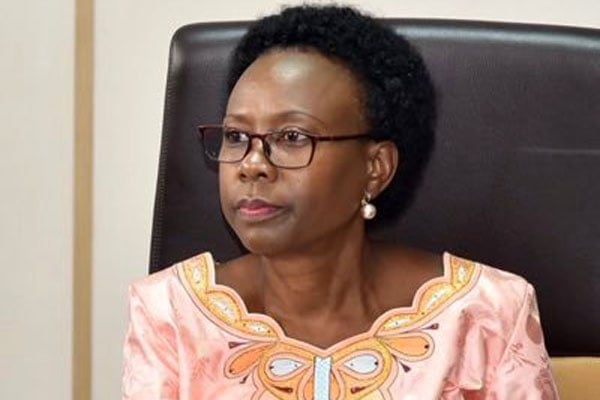Why ministry is talking of another lockdown

Travellers scramble for a taxi at New Taxi Park in Kampala on June 8. Health Minister Jane Ruth Aceng has hinted on the possibility of the country being placed under another lockdown over what is perceived as complacency by the public in the fight against the spread of Covid-19. PHOTO BY DAVID LUBOWA.
What you need to know:
- Health minister Jane Ruth Aceng says the complacency by the public is presenting a fertile bed for a sharp spike in the number of Covid-19 infections, which will most likely culminate in mass death.
- Workers MP Sam Lyomoki, who is a member of the Parliamentary Committee on Health, defends the Ministry of Health against giving feeding the public with cooked up figures, but insists that it is using the wrong parameters in assessing the numbers of infections in the community.
As Covid-19 cases continue to rise, Health Minister Jane Ruth Aceng on Wednesday, hinted on the possibility of the country being placed under another lockdown over what is perceived as complacency by the public in the fight against the spread of the virus.
“People are no longer following preventive measures. This is evident from what is going in the markets, taxis and bus parks,” she said.
Minister Aceng warned that the situation presented a fertile bed for a sharp spike in the number of infections, which would most likely culminate in mass death. This, she argued, makes another lockdown necessary.
The minister’s comments came a day after President Museveni had voiced his frustrations with Ugandans for failure to observe preventive measures.
However, the President’s and ministers words have not been taken lightly. Some citizens have taken to social media urging Ugandans to prepare for a lockdown.
“If you are in Kampala and want to go upcountry do it as soon as possible. In fact do not miss tomorrow’s travel,” read one such post.
READ:
Efforts to reach Minister Aceng to clarify on her comments were futile but but State Minister for Health, Dr Joyce Moriku Kaducu, said total lockdown is a possibility, but many people do not seem to appreciate the need for such a move.
“At first, it was about the truck drivers, but the problem now is infection of the people in the communities,” Dr Moriku said.
Calls to open up
In the third week of March, when the lockdown was announced, Ugandans seemed to obey all measures that were being enforced by the government without question, but not anymore.
On May 24, the Mufti, Sheikh Ramadhan Mubajje, demanded reopening of houses of worship with standard operating procedures in place.
“If the public transport is to be allowed to operate then even places of worship should be re-opened so that people can congregate to pray for their country to overcome this pandemic,” he said.
On May 31, Anglican and Catholic leaders, Archbishop Samuel Kaziimba and Kampala Catholic Archbishop Cyprian Kizito Lwanga, also called for reopening of places of worship.
The opposition Forum for Democratic Change (FDC), has issued its own political roadmap while Kyadondo East MP, Mr Robert Kyagulanyi aka Bobi Wine, has called upon government to allow boda bodas to return to work for as long as they have masks.
Resistance
Sections of the populace are inclined to think that whereas they made sacrifices by obeying government directives, the government has not fulfilled its end of the bargain.
For example, some of the people who were promised the relief food never received it while those who got claim it was of poor quality.
The biggest talking point has been why government allowed entry of cross-border trucks into Uganda even when they were at some point the only known transmitter of the virus.
The President said such a move would be suicidal. “I say it is suicidal because, if we stop cargo, how will our coffee (and cotton, tea, cotton, milk, cement from the factories and food) move?” he asked during a televised address to the nation.
Sections of the public are increasingly getting agitated.
On June 1, Kilak County MP Gilbert Olanya, and his Aruu County counterpart, Mr Odongo Otto, were arrested by the police in Gulu, for trying to organise a demonstration over the increase in Covid-19 cases, which they attributed to truck drivers who enter the country through Elegu Border point.
Unpopular decision
However, it is clear from the foregoing that another lockdown would be a very unpopular decision and those in government are all too aware.
“That (lockdown) is not the best option that we are considering. That President does not want it for the people,” Dr Moriku says.
Why then is there talk about another lockdown. “The problem has been the reluctance of the people to observe standard operating procedures. If that is how we move there will be a total lockdown,” Dr Moriku says.
Arua Municipality MP Kassiano Ezati Wadri agrees that it would be necessary for the country to go back into lockdown if the virus spreads in the communities, but hastens to add that this time round government should be using the lockdown to increase preparedness of the health sector to deal with the virus and other medical challenges.
“The lockdown was meant to have given us time to scale up our capacity in terms of bed capacity, manpower recruitment and training and acquisition of equipment, but that did not happen. Now instead of making more funds available to the Ministry of Health to do that they have cut its budget,” Mr Wadri says.
Social media has since Wednesday been awash with suggestions that government has not been open about the levels of infection.
“Government was hoarding data on the actual number of infections and deaths,” read one of the posts.
Workers MP Sam Lyomoki, who is a member of the Parliamentary Committee on Health, defends the Ministry of Health against giving feeding the public with cooked up figures, but insists that it is using the wrong parameters in assessing the numbers of infections in the community.
“The pool of information that the Ministry is relying on is so limited. They have so far limited themselves to truck drivers and contacts. There has been very little testing in the communities. So we definitely have a bigger situation than they are telling us,” Dr Lyomoki says.
Dr Moriku also defends government against accusations of giving out wrong information, but suggests that government is not aware of how big the problem is.
“The problem is that there is a shortage of testing kits. If we get them we shall carry out another rapid testing exercise to assess the magnitude of the problem in the communities,” she says.
The Uganda Virus Research Institute (UVRI) has been suffering shortages of essential testing kits for the virus since May, a situation which government blamed on increasing number of truck drivers, limited supply from foreign manufacturers and delays in movement of cargo.





